Rivera Sun's Blog: From the Desk of Rivera Sun, page 21
July 4, 2017
Cherry Pitting
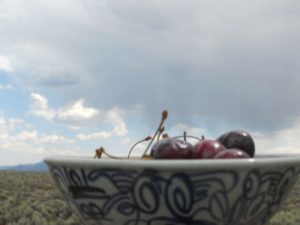 Crimson, blood red, deep as the birth labors of our mothers, trillions throughout time, a swarm of human creel, tiny and minute against the vast ink oceans of universe, every great thrust of change, a whale swallowing us all.
Crimson, blood red, deep as the birth labors of our mothers, trillions throughout time, a swarm of human creel, tiny and minute against the vast ink oceans of universe, every great thrust of change, a whale swallowing us all.
My fingers, pale and dripping with the depth of cherry-tart sweetness, slice tensile skin and rip the heart of the pit from the soft fruit. One bowl. A second. Halved and pitted, I am freezing cherries for later months, long past the orchards’ bearing.
Overhead, the bruised thunderheads collide. In sweeps of shadow and light, our space-traveling sun rushes across the desert. The wind tiptoes, cautious in her mischief, barely ruffling the dry grasses.
Ancient time and the expanse of the earth stand at my shoulders like sisters as I pit cherries. It’s a day like any other, but today the veil is lifted, the mundane living room curtain we humans throw over the window to the mythic, desperate as nervous housewives to keep up appearances, make-pretending normality while beneath our aprons and fixed smiles, the gaping maw of creation roars and the whale’s mouth of the epoch swallows us whole, along with our mothers, our histories, and our blood-red cherry lives.
Author/Activist Rivera Sun is the author of The Dandelion Insurrection and other books, the cohost of Love (and Revolution) Radio, and a trainer in strategy for nonviolent movements. www.riverasun.com
June 15, 2017
Good Books Make Great Friends During the Wild Ride of Our Times

Embark On An Adventure
Great Novels. Great Discounts.
4 Days Left For Our Summer Reading Sale!!!
Good books are great friends during tumultuous times. The best ones entice our love of adventure while grounding us for engaging with the changes in our world. At least, these are the stories I love best, the ones I write about where people like us teeter on the cliff’s edge of adventure and uncertainty, and ultimately come out shining. We’re offering 20% off all my novels in our Summer Reading Sale on our website. It only runs for 4 more days (until June 18th) so take a peek. It’s a great time to get a copy of your favorites to give to friends . . . and to pick up the book you haven’t read yet.
Best summer reading photo: The Way Between is being enjoyed my Norwegian friend Emily on a beach in Spain. (Yes, the novels do get around. They’re being read across the world, especially now that the kindles and ebooks are available.) Ari Ara’s fantastic adventure story is the perfect book for dropping out and tuning in, reconnecting your heart to courageous peace-making. It’s delightful. Emily says: Yes! Yes! Yes! I can highly recommend this book! Loving it! It is truly magical and Ari Ara is a thrilling character. I was already hooked from chapter 1. The book is called “The Way Between” and it is amazingly written.
I’m glad you’re enjoying it, Emily!
Whether you’re raring to go with the nonviolent movement in The Dandelion Insurrection or looking for inspiration for climate action via Steam Drills or yearning for a (somewhat) enlightened perspective on wealth along with the Billionaire Buddha, these are books that will engage the heart as deeply as the mind. Enjoyable and engaging, they find that rare balance between giving our world-weary minds a rest while avoiding the mindless numbing of so much of our books and movies. Here’s where to find our Summer Reading Sale, 20% off all books, and a super-great shipping rate: http://www.riverasun.com/online-store/
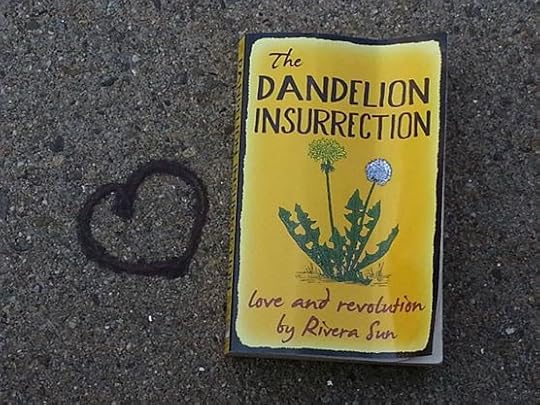 Be sure to visit the website – we have discount shipping rates to go along with the sale. There’s nothing like getting a stack of books in the mail just when you’re itching to kick back and relax for a moment. Enjoy!
Be sure to visit the website – we have discount shipping rates to go along with the sale. There’s nothing like getting a stack of books in the mail just when you’re itching to kick back and relax for a moment. Enjoy!
Love,
Rivera
PS Got a favorite summer reading photo? Send it to me! We’ll share it with other readers.
June 10, 2017
Summer Reading Sale! 20% Off and GREAT Shipping Rates!

Summer Reading Sale!!!
20% Off All Books and Discount Shipping!
(I see hammocks and beach chairs and books in your future.)
Big news on all fronts … major changes in the world of this red-headed authoress. I’ll tell you more below, but first, let me share the GREAT news. We’re having a Summer Reading Sale on our website. The days are getting hot and lazy around here in New Mexico, so w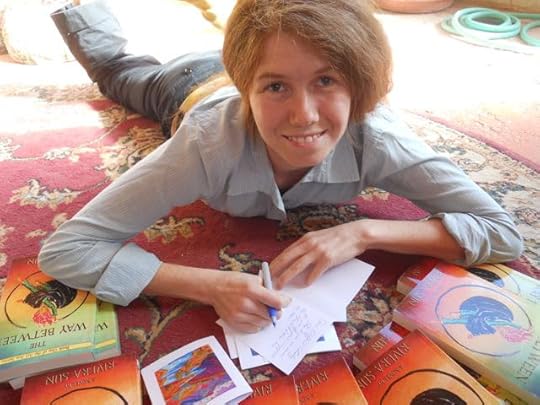 e thought this would be a great time to add some epic stories to your summer reading stack. Or to send a book to a friend. Or (and this is really the best idea) to send The Way Between to a kid with time on her hands this summer. Can you imagine being 10-11 years old and being handed that amazing story? I can. My ten-year-old self would have devoured every page and spent the rest of the summer practicing the Way Between wearing a black cloak just like Ari Ara’s. Come September, I’d head back to school with some anti-bullying insights in my back pocket … and eagerly awaiting the next novel in the series.
e thought this would be a great time to add some epic stories to your summer reading stack. Or to send a book to a friend. Or (and this is really the best idea) to send The Way Between to a kid with time on her hands this summer. Can you imagine being 10-11 years old and being handed that amazing story? I can. My ten-year-old self would have devoured every page and spent the rest of the summer practicing the Way Between wearing a black cloak just like Ari Ara’s. Come September, I’d head back to school with some anti-bullying insights in my back pocket … and eagerly awaiting the next novel in the series.
Here’s where to find our Summer Reading Sale, 20% off all books, and a super-great shipping rate: http://www.riverasun.com/online-store/
The sale is this week only, so if you’ve been itching to get The Dandelion Insurrection for your friend, or read Steam Drills or Billionaire Buddha, or get a whole collection for your local library, now is the perfect time!
Now for the big news … if you haven’t heard via email, phone call, or social media, I’ve had an interesting month. I underwent an emergency surgery to remove two cancerous lumps on my ovaries and uterus, and will be following up with further treatment over the summer. The good news? I’m doing GREAT. Seriously. I’m not just saying that. I’ve got a lot of love and support, excellent doctors, a rockin’ naturopath, and (as y’all know) a hefty dose of spiritual strength to carry me through. Now that I’m (somewhat) recovered from the surgery, I’m writing again. I move a bit slower than my usual breakneck pace, take naps, and spend time each day thanking my body and this world for the gift of life. So, don’t worry. It doesn’t do me or you any good.
surgery to remove two cancerous lumps on my ovaries and uterus, and will be following up with further treatment over the summer. The good news? I’m doing GREAT. Seriously. I’m not just saying that. I’ve got a lot of love and support, excellent doctors, a rockin’ naturopath, and (as y’all know) a hefty dose of spiritual strength to carry me through. Now that I’m (somewhat) recovered from the surgery, I’m writing again. I move a bit slower than my usual breakneck pace, take naps, and spend time each day thanking my body and this world for the gift of life. So, don’t worry. It doesn’t do me or you any good.
(If you’d like to do something, buy a book and share the stories with someone you love. It helps me and your friends.)
I hope your summer is filled with beautiful stories – both unfolding on the page and in real life. May your adventures be filled with good friends and surmountable challenges. And may all of our hearts be present and clear for and with one another through these times.
Love,
Rivera
May 17, 2017
Radical Love
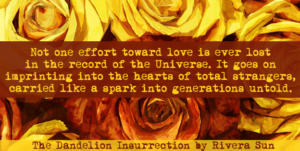
Quote from Rivera Sun’s novel, The Dandelion Insurrection
I used to think of love as a side dish to social political change – the green beans next to the meat and potatoes of power and struggle. But, the more I live in the gritty world of honest humanity, the more I suspect that love is the essential mineral lacking in our nation’s veins. We’ve got deficiency symptoms: tremors, shakes, deliriums, rages, madness, fits, addictions, and lashings out. Every cell in our collective and individual bodies is screaming for this nutrient called love. And because we can’t get it, we crave paltry substitutions such as power, domination, money, and violence.
Privilege provides no shelter from this deficiency. In fact, it tends to make it worse. For the structure of success in the United States of America has been built on a centuries old devil’s bargain in which we cut out a piece of our heart to secure money, power, and position. From the early colonists massacring Native Americans to ensure their place on this continent to contemporary politicians giving tax breaks to the wealthy while cutting healthcare funding for the poor, we see the trade off of love over and over again. Our compassion atrophies in the dog-eat-dog version of reality that we’ve created in the United States. It shrinks down to a peanut-sized organ capable of loving only one’s family, or dog, or the people who look, act, and think just like one’s self. The withered hearts sold piecemeal for wealth and power have lost the capacity to love boldly and widely, in broad and inclusive ways that extend to their fellow citizens or even to the whole of humanity worldwide.
When our souls cry out in shakes and rages from lack of love, we lash out to the extent our power permits. The poor hurt each other. The rich pass policies that hurt millions of people. Some pull guns on one another; politicians drop bombs on foreign countries. We start fights in our families; our military wages war overseas. A child steals candy from a younger sibling; the wealthy steal trillions from the rest of us. The neighbor refuses to help us when we’re sick; our Congresspersons cut funding for healthcare. Rich, poor, powerful and marginalized, wherever this deficiency of love arises, cruelty and suffering abound. Beneath the screaming torrent of other rationales and excuses are broken human beings shuddering in the grips of a multi-generational deficiency that is slowly – or rapidly – killing us, our nation, and the earth.
Hundreds of campaigns are launched on all sides of the political spectrum to “save the world” or the whales or the workers or the economy or family values or civil rights . . . everything! Most of them deliver a right-left punch to the other side that essentially shouts, “you bad, evil people, stop that at once!” Every time we attack each other in such a manner, our mineral deficiency drops lower on both sides of the conflict.
Perhaps people in the social justice movements don’t notice. The feelings of solidarity that can arise within movements can mask the ways hate for one’s opposition depletes the soul. More obvious is the effect within the opposition. Sensing hate from the movement, their hearts close off, the deficiency of love drops further, and they lash out violently, entrenching in defense of their actions. It’s ironic, because the very behaviors or policies the movement objects to came about because the people involved in the injustice sought to satisfy their aching craving for love through greed, domination, control, power, violence, or discrimination. By attacking them, we’re sowing the seeds for more of the same vicious cycle.
Vilifying people often fails to address the root of the problem, the deep hurts and wounds, fears and insecurities that people carry. There are thousands of wounded people in positions of power, millions waiting in the wings to take their places, and a whole nation raging and moaning for love, hurting one another in large and small ways.
So, I propose a radical approach: that we bring love into our movements for change, adopting Dr. King’s principle to be against injustice, not against people. We cannot condone destructive and harmful behaviors and policies. However, we can learn to see each other with the eyes of love, to look at our fellow human beings with compassion and sorrow over such actions, rather than hate and fury. In so doing, we can begin to replenish that mineral deficiency that is killing our nation’s soul, not to mention the bodies of our brothers and sisters, and the vitality of the planet. We can recognize the underlying void in the cells and marrow of people that causes them to behave in such destructive ways. We can begin to satisfy the deep craving for respect and understanding – which are often ways that love is expressed in public settings.
I believe we will go further in our efforts toward justice if we break down the walls of hate and fear that have arisen between factions of our populace. I think bringing groups who currently stand opposed to one another into face-to-face encounters is as radically transformational as protests, boycotts, and strikes. Creating situations where people must listen to each other’s viewpoints, hear each other’s stories, and deal with real humans not just statistics can be as positively confrontational as direct action. And, I have faith that approaching one another with basic love and respect even in the midst of opposing unjust policies and practices allows the humanity that exists in all of us to resurface. It helps those who have made devil’s bargains to reclaim pieces of their hearts. It prevents us from making the same mistake and cutting off a part of our broad love for humanity in order to hate our opposition. I think this approach is complementary to a movement’s use of firm, strategic, nonviolent action to stop injustice and harm. In addition, it offers us a powerful path toward healing in a deep and profound way.
Our other option – the one we’ve been using – is to hate each other more, attack more, despise one another in increasing cycles of animosity and division. We are locked in modes of trying to overpower our “enemies”, prove them wrong and punish them for their bad ways of thinking. In response, they attack us back, defend their positions, and try to dominate us in response. We have dug ourselves into a deep and dangerous hole that has led to horrific suffering, cruelty, and pain. I’d like to climb out of that hole. If that requires a radical act of love against impossible odds, I’m willing to do it.
How about you?
___________
Author/Activist Rivera Sun is the author of The Dandelion Insurrection and other books, the cohost of Love (and Revolution) Radio, and a trainer in strategy for nonviolent movements. www.riverasun.com
May 1, 2017
Where Is Your Loyalty?
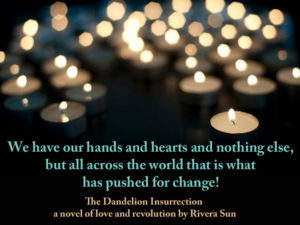 An Essay of the Man From the North
An Essay of the Man From the North
by Rivera Sun
For all the avowed patriots who demand my Pledge of Allegiance and salutes on Loyalty Day, Fourth of July, and other patriotic, militarized holidays, I fling this question to your hearts: how deep and far does your loyalty to your country run?
We applaud those who risk their lives in battlefields, allegedly defending our country in wars that we later understand to be for the profits of privileged elites. Yet, too many disdain the homeless man – your fellow citizen – in the street; our loyalty to our country appears to stop there. Our national celebrations of loyalty and service are charades. They demand loyalty of all citizens by demonstrating our loyalty to our military and politicians. But where is the loyalty to our fellow citizens who are suffering? When do we honor that?
What is love of one’s country if not a love that extends beyond ideals and platitudes to weep over the injustices and harms experienced within our nation? Is it love to stay silent when remediable suffering abounds? Is it devotion to allow the children of our nation to lack potable drinking water while billions are spent on more weaponry?
My love – and loyalty to – my country is not a set of slogans, lofty skyscrapers, or staggering amasses of wealth. No, my love of my country is courageous enough to include the broken and hurting places; the weeping rivers contaminated with coal sludge; the infants who die early from fracking contaminants; the veterans wracked unto suicide with the horrors they’ve experienced; the poor thrown out of homes, onto the streets, driven out of towns to die in the margins. My country is large enough to include every inch of our lands with an unflinching gaze, seeing the prosperous and plighted, greedy and generous, alike.
My loyalty resides in tending to the least of us, the most abused and broken-hearted, the marginalized, and the forgotten. A country is not a standard of measurement by which some are damned and excluded, and others are accepted and exalted. A nation is a promise, a commitment to all those born on its soil and all those who join later in life, that we will bear a tender responsibility to one another, that we will care for one another, that we will help one another through life. Our nation fails, again and again, to live up to this. My heart aches for this failing, as well. That is what loyalty does: it holds up our potential and calls us back to it unceasingly no matter how much we err.
My love of my country cannot be symbolized by flags and parades and uniforms and speeches, for it extends far beyond the confines of humanity. Every stream, lake, ocean shore, forest, field, mountain; the bears, eagles, moose, wolves, coyotes, foxes, whales, dolphins, salmon, catfish, lobster, rabbit, mouse, ant, centipede; every beast and being of this land demands our loyalty as well.
And when I am slapped with the demand for patriotic loyalty and unquestioning obedience to authorities, I turn my other cheek and ask: where then is our loyalty to democracy? That which questions, critiques, dissents? Where is our loyalty to the rest of our people, the ones who suffer in our streets? Where is our loyalty to our land and waters, that which builds the very firmament of our being?
Do not throw this shallow loyalty of puppets and politicians at me! It reeks of greed and hypocrisy. It smacks of coercion and deception. It stinks of lies and manipulation.
My loyalty runs as deep as the oceans, wide as the great vast sky that stretches across our country. It refuses to look away from the suffering of any inch of our nation: human, animal, plant, mineral, elemental. It stands at the sickbed of those without healthcare. It bears witness to the people shot in the streets. It remembers the hidden millions in prisons. It starkly sees the cruelties of moguls, magnates, and tycoons. It aches as the waters of this nation are poisoned. It weeps as the great mountains are blasted to bits.
A loyalty un-blinded rages at the injustices of this country; it holds the feet of power holders to the fire of truth; it dares to critique, to dissent, to speak out . . . indeed, it does not dare be silent.
When someone you love is in danger, or causes injustice and great harm to others, your loyalty demands that you act to dissuade them from the path that they’re on, and return them to sanity, awareness and compassion.
That is my loyalty to my country, that I will speak out against our wrongdoings and cruelties; that I will dissent from the demand for unquestioned obedience to authority; that I will love my country so ferociously that I will not allow us to remain complacent, nor deluded by the addiction to power and control; that I must speak for the other species that share our geography; and that I will include, unflinchingly, the face of every human being who lives here in my definition of my country. Such is my loyalty. Such is my love.
______________
The Man From the North is a fictional writer in Rivera Sun’s novel, The Dandelion Insurrectio n. The novel takes place in the near future, in “a time that looms around the corner of today”, when a rising police state controlled by the corporate-political elite have plunged the nation into the grip of a hidden dictatorship. In spite of severe surveillance and repression, the Man From the North’s banned articles circulate through the American populace, reporting on resistance and fomenting nonviolent revolution. This article is one of a series written by The Man From the North, which are not included in the novel, but can be read here .
Author/Activist Rivera Sun , syndicated by PeaceVoice , is the author of The Dandelion Insurrection and other books, and the cohost of Love (and Revolution) Radio.
April 3, 2017
Novel News! Steam Drills Make-Over; The Roots of Resistance, and more!
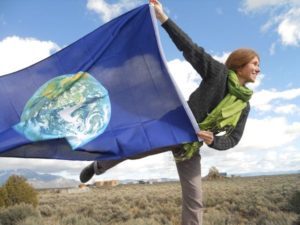 And . . . Free Earth Flags!
And . . . Free Earth Flags!(Yes, this is a super-fun newsletter. Enjoy.)
 Greetings everyone! Great news abounds. First of all, my first novel, Steam Drills, received a make-over in time for Earth Day and we’re giving away free Earth Flags when you get a copy of the new version. I love these flags and bring them to demonstrations all the time! In the spirit of Steam Drills, a novel about climate justice and the story of our times, we’re happy to love the Earth like she deserves and to fly her flag joyously! This is the perfect year to read this book, to move into action, to go to your local “Scientists March” on Earth Day or the People’s Climate Marches on April 29th carrying the image of our beloved planet with you!
Greetings everyone! Great news abounds. First of all, my first novel, Steam Drills, received a make-over in time for Earth Day and we’re giving away free Earth Flags when you get a copy of the new version. I love these flags and bring them to demonstrations all the time! In the spirit of Steam Drills, a novel about climate justice and the story of our times, we’re happy to love the Earth like she deserves and to fly her flag joyously! This is the perfect year to read this book, to move into action, to go to your local “Scientists March” on Earth Day or the People’s Climate Marches on April 29th carrying the image of our beloved planet with you!
Find this special offer here: http://www.riverasun.com/online-store/steam-drills-treadmills-and-shooting-stars/
 And drumroll, please . . . to the right we have a photo of the first draft manuscript (all handwritten!) of The Roots of Resistance, the sequel to the much-loved Dandelion Insurrection. It’s a beautiful, emergent moment when a novel reaches this point. You can “see” the plot, the characters, the adventure. Next, I type it into the computer and then revise, revise, revise. This is where the good becomes great, and the story starts to sing. I’m so happy with how this novel is turning out … as good as the first, powerful, evocative, and fun.
And drumroll, please . . . to the right we have a photo of the first draft manuscript (all handwritten!) of The Roots of Resistance, the sequel to the much-loved Dandelion Insurrection. It’s a beautiful, emergent moment when a novel reaches this point. You can “see” the plot, the characters, the adventure. Next, I type it into the computer and then revise, revise, revise. This is where the good becomes great, and the story starts to sing. I’m so happy with how this novel is turning out … as good as the first, powerful, evocative, and fun.
Did you miss the Author Q & A about The Way Between? We had an amazing conversation about the role of literature in building peace and promoting a culture of active nonviolence in fun and fantastic ways. Here’s the recording! Enjoy! https://youtu.be/6WZST3LTodk
Speaking of The Way Between, on Friday, I’m off to Gainesville, FL to dodge alligators – just kidding. I’m attending the River Phoenix Center for Peacebuilding’s Peacebuilders Immersion Program. I’ll be studying with some amazing people, connecting to new skills and perspectives, and . . . 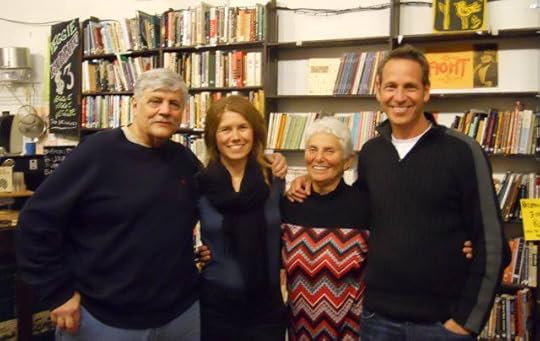 getting ideas for Ari Ara’s next adventure, which I plan to write over the late summer and early fall. (Cross your fingers and we’ll have this novel in time for Christmas gifts. Won’t that be awesome?) Pictured in the photo are my friends, Burt Kempner (who connected me to the peacebuilders initially), Heart Phoenix and Jeffrey Weisberg, who run the program along with others. I am very grateful for all of their help in making this opportunity possible. I met them all during The Dandelion Insurrection Tour a few years back.
getting ideas for Ari Ara’s next adventure, which I plan to write over the late summer and early fall. (Cross your fingers and we’ll have this novel in time for Christmas gifts. Won’t that be awesome?) Pictured in the photo are my friends, Burt Kempner (who connected me to the peacebuilders initially), Heart Phoenix and Jeffrey Weisberg, who run the program along with others. I am very grateful for all of their help in making this opportunity possible. I met them all during The Dandelion Insurrection Tour a few years back.
Here’s some unexpected good news: apparently, Amazon readers are discovering Billionaire Buddha! We’re getting a lot of visits and book sales on our page, so if you’ve already read this novel, leave a short review so people who are finding the book know how much you liked it.
 Oh yeah, the BIGGEST news! I’m a full-time author! That’s right, thanks to countless supporters and readers like yourself, I’m now able to write all-day, every day, bringing powerful stories that change hearts and minds into a world that desperately needs them at an accelerated rate. March 1st, 2017 was my first day without my “day job” and it has been an outrageously productive month! Hooray and huge thanks to everyone who has helped the readership grow and supported me as an author along the way!
Oh yeah, the BIGGEST news! I’m a full-time author! That’s right, thanks to countless supporters and readers like yourself, I’m now able to write all-day, every day, bringing powerful stories that change hearts and minds into a world that desperately needs them at an accelerated rate. March 1st, 2017 was my first day without my “day job” and it has been an outrageously productive month! Hooray and huge thanks to everyone who has helped the readership grow and supported me as an author along the way!
Love,
Rivera
March 13, 2017
Throw Off the Tyranny of Poverty! – An Essay of the Man From the North
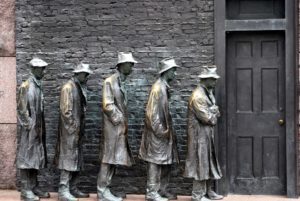
Creative Commons CCO License. Support the Commons!
An Essay of the Man From the North
by Rivera Sun
Curse the war culture! It leaves us at a loss for words, bereft of metaphors to describe our situation. Our minds become blank slates, unable to recognize dangers at the door unless they carry assault weapons or drop bombs on our heads.
Poverty and poverty-related social factors will kill more of us than terrorism – one hundred will die each hour. And yet, our politicians scrounge up bogeymen to scare us! They need simply look around at the bloodsucking greed that leaves us dry as dust and crippled from unending debt.
What more do we need to rise into action? Do we need bombs instead of bank policies to make this crisis clear? Do we need soldiers with bayonets pounding down our doors instead of lawyers and bill collectors in suits and ties? There is nothing metaphorical about a danger that robs the breath from 2,400 citizens each day! There is no excuse for political inaction that fails to protect and defend the hundreds of thousands who will die from poverty and poverty-related social factors each year!
Mobilize! Gather the hot-blooded and cool-headed in your community. Drill and train in nonviolent action with all the ferocity of traditional boot camp. Turn out the ranks – young and old – of people who can wield a boycott, build a blockade, charge in with a divestment campaign, sound the clarion call to march and protest, and more.
With the tools of nonviolent action in our hands, we, the People, become a force to be reckoned with. Strikes, shutdowns, walkouts, noncooperation, civil disobedience, and more: these tools are twice as effective as violent means at overthrowing tyrannical regimes, repelling foreign invasions, and ending occupations. And what is poverty, but an occupying power that dictates cruel edicts that cause suffering and oppression in our lives?
The danger prowling our streets thrives on violence and is fed doubly when war robs the bread from our children’s hands. Poverty cannot be stopped by bullets, but it can be halted, pushed back, and sent running by organized nonviolent action. We can challenge and transform the systemic underlying causes of concentrated wealth, lack of real democracy, oligarchic rule, corporate greed, unjust laws, the shackles of debt practices, lack of economic justice, and the corruption of cultural values that give rise to the permissibility of hoarding, greed, plundering, looting, and stealing. We can wage nonviolent struggle against each of these on every level from national politics to massive corporate policies to local businesses and the hidden workings of the human heart.
We need not wait for bombs or bullets to see clearly where the danger lies. Today, thousands of people will die waiting for us to mobilize and succeed. Tomorrow, thousands more will die if we do not rally to stop the danger pounding on our doors. Day in and day out, the casualties mount while we flounder. Those who feel the tightening stranglehold of poverty crushing the life breath from their chest are crying out. The tools of change are at hand! Wake up! Seize the day, organize, train, resist and build to chase the tyranny of poverty away.
________________
The Man From the North is a fictional writer in Rivera Sun’s novel, The Dandelion Insurrectio n. The novel takes place in the near future, in “a time that looms around the corner of today”, when a rising police state controlled by the corporate-political elite have plunged the nation into the grip of a hidden dictatorship. In spite of severe surveillance and repression, the Man From the North’s banned articles circulate through the American populace, reporting on resistance and fomenting nonviolent revolution. This article is one of a series written by The Man From the North, which are not included in the novel, but can be read here .
Author/Activist Rivera Sun is the author of The Dandelion Insurrection and other books, the cohost of Love (and Revolution) Radio, and a trainer in strategy for nonviolent movements. www.riverasun.com
March 5, 2017
Polite and Apolitical? Repression By Another Name
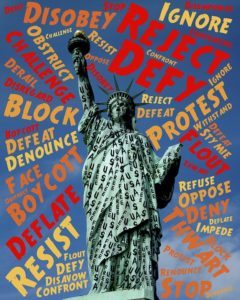
Creative Commons License CCO by John Hain
An Essay of the Man from the North
by Rivera Sun
There are those who would have us fold up our banners and take down our protest signs. They urge us to be reasonable and polite. They expect us to cram our dissent into narrow boxes of occasional grumbling comments and take our frustration out at the election box once every few years. These people write letters to the editor of small town newspapers claiming that the visible signs of dissatisfaction – pickets, protesters, political signs – are bad for business and distasteful.
Such sentiments pose great dangers to democracy. Those voices who call for clearing the rabble-rousers from the street fail to perceive that our streets are packed with political messages already. Every corner gas station proudly proclaims its right to destroy our Earth. Every downtown business asserts that commerce is essential and central to community. Each shop selling inoffensive landscape postcards, tourist books, and knickknacks rather than protest banners and political posters is not “neutral” on the issues. It is a bold proclamation that the issues are not as important as maintaining the status quo of business as usual.
From such a perspective, our towns and cities are dominated by the political messaging of the supremacy of commerce. When people complain about their fellow citizens holding signs on the street corners, they are, in essence, stating that they believe commerce and commerce-only should have the right to state its message. This is not democracy. This is totalitarianism.
The right to dissent is essential for functional democracy. Discourse, dialogue, differing views, contention, argument, and the many forms of protest and persuasion are inseparable from a society that can discuss its differences and work toward self-governing resolution. A politely apolitical public society is not neutral; it is enslaved to unstated ideologies, and bound up by cultural apathy and fear. Public space should be as fraught with our differences as the realities of our populace’s hearts and minds.
Politeness has devolved from basic respect into a form of repression by which dissent is stifled and silenced. Instead of politeness and propriety, we must embrace the difficult path of honesty and compassion. We must speak truth – for there are hard and painful truths that our nation needs to face – and such truth should be tempered only by our willingness to see the humanity of all people, and to allow our basic compassion and respect to guide our words and actions.
So, go forth with your signs. Lift your banners high. Break silence. Speak out. Fill our streets and public spaces with equal measures of honesty and compassion. Allow the truth to be held up like a mirror to the sickness that ails our society so that they – and we – might understand the reality of what we have become. And, so that they and we can change, heal, and learn to live again.
The Man From the North is a fictional writer in Rivera Sun’s novel, The Dandelion Insurrectio n. The novel takes place in the near future, in “a time that looms around the corner of today”, when a rising police state controlled by the corporate-political elite have plunged the nation into the grip of a hidden dictatorship. In spite of severe surveillance and repression, the Man From the North’s banned articles circulate through the American populace, reporting on resistance and fomenting nonviolent revolution. This article is one of a series written by The Man From the North, which are not included in the novel, but can be read here .
Author/Activist Rivera Sun is the author of The Dandelion Insurrection and other books, the cohost of Love (and Revolution) Radio, and a trainer in strategy for nonviolent movements. www.riverasun.com
March 1, 2017
Autumn Dances and Ancestor Spirits – an excerpt from The Way Between
(Excerpt from The Way Between by Rivera Sun. Find it on Amazon.com or signed copies here.)
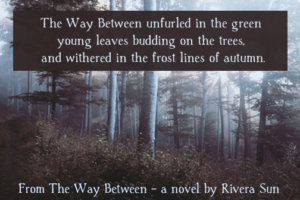 The Horns of Monk’s Hand sounded as the sun touched the western shoulder of Old Monk Mountain. The Fanten drums halted for a breath, acknowledging the Horns through silence. Ari Ara shivered at the lingering reverberations of the low moaning sounds. In previous years, she had heard them mostly from a distance. Even in the Fanten Forest, the tremors could be felt underfoot. Here, the sonorous cries deafened her ears.
The Horns of Monk’s Hand sounded as the sun touched the western shoulder of Old Monk Mountain. The Fanten drums halted for a breath, acknowledging the Horns through silence. Ari Ara shivered at the lingering reverberations of the low moaning sounds. In previous years, she had heard them mostly from a distance. Even in the Fanten Forest, the tremors could be felt underfoot. Here, the sonorous cries deafened her ears.
“Stay close tonight,” Shulen warned her. “When the ancestors start walking in the mountains, strange things happen.”
“That’s just a child’s tale,” she scoffed.
He raised his grey eyebrows at her.
“Not all my scars come from mortal hands,” he said in such a serious tone that Minli squeaked in fear.
“He’s just trying to scare us,” Ari Ara whispered to Minli as Shulen turned away. But, she inched closer to her friend and watched the growing darkness nervously.
Strange things did happen this time of year, she admitted quietly to herself. Even the Fanten kept close to their ceremonial fires on this night. She decided not to test the ancestors.
The senior monks gathered under the tiled overhangs of the three-sided courtyard, settling cross-legged. The oldest ones looked on the brink of departing for the spirit world, Ari Ara thought. The trainees and orphans gathered behind the senior monks on the benches that lined the walls. Bundled in robes and cloaks against the cold night, their huddled figures appeared eerily misshapen.
Suddenly, on one breath, the senior monks began to chant in low growling tones that rolled and groaned as if the stones of the river had learned to speak. They started with the names of the Three Brothers: Marin, Shirar, and Alaren, then the sons and daughters of the first two brothers, and the royal lineages they founded. What about the Third Brother? Ari Ara wondered. Why don’t they recite his children? The litany would continue until dawn, Minli informed her, the younger monks taking over for the older monks until the orphans spoke the name of Alinore to the rising sun. The Desert King and the Lost Heir would not be named . . . not until they passed into the spirit realms. What will they do a thousand years from now, Ari Ara wondered, when the list is too long for a single night? Chant faster?
Head Monk stepped forward holding a flaming torch aloft. The leaping light and pulse of voices swirled around him. His red ceremonial robes seemed to be woven into fire, bloodlines, and the ancestor spirits. He spoke in Old Tongue and then set the torch to the base of the bonfire. It erupted. Flames leapt above the roofline of the monastery. Ari Ara gasped. She stared wide-eyed at the towering fire, secretly relieved that the stone buildings stood no chance of catching aflame. The ferocity of the fire sent a thrill of fear and excitement through her body. These were the bones of the Great Trees blazing and opening the gateway to the spirit world. The incense of their smoke filled the night. The heat pushed her back. Darkness was thrown away from the courtyard. The stones of the monastery illuminated with glowing light. Beyond them, the night hung more solidly than ever.
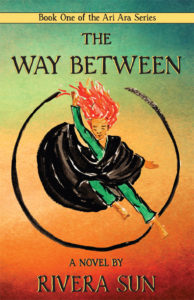 Time altered and stretched. The monks chanted unceasingly. At some point, the fire shrank to the height of a man. Ari Ara and the orphans crept closer as the cold began to slip in. She glanced up over the roofline. Stars shone overhead. The oldest monks relinquished their places in the chanting. Younger monks took over. Then, unexpectedly, the chorus of voices dropped into a whisper and the sound of the Fanten drums could be heard in the distance. The Head Monk gestured for the orphans and trainees to gather closer to the fire. Ari Ara stepped into the circle with the children.
Time altered and stretched. The monks chanted unceasingly. At some point, the fire shrank to the height of a man. Ari Ara and the orphans crept closer as the cold began to slip in. She glanced up over the roofline. Stars shone overhead. The oldest monks relinquished their places in the chanting. Younger monks took over. Then, unexpectedly, the chorus of voices dropped into a whisper and the sound of the Fanten drums could be heard in the distance. The Head Monk gestured for the orphans and trainees to gather closer to the fire. Ari Ara stepped into the circle with the children.
“We whisper the names because there are so many deaths in this part of Mariana’s history,” Head Monk explained. “This was a time when a great plague struck Mari Valley. All was nearly lost. The Fanten came down from the mountains and the mists, bearing their herbs and secrets. Out of respect for the dead and in gratitude for the Fanten’s help, we whisper the names to let the ancestor spirits hear the sound of the Fanten drums. We do not know what the rhythms mean; so much of the Fanten way is cloaked in secrecy – ”
“It’s not a secret,” Ari Ara corrected absently, half-dazed by the dance of the flames. “They would explain, but no one comes to ask or listen. That’s what the Fanten Grandmother told me once.”
All heads turned in her direction. She glanced up, uncomfortable to be the focus of so many curious stares.
“So, what are they drumming about?” Brol challenged her from across the circle.
Ari Ara glanced at Head Monk for permission. The whispering of names rippled all around them. The monks had split into many threads of family lines, each speaking his individual part of the recitation. The resulting sound was hair-raising and chilling. It was the only way to speak the names of the thousands lost to the plague.
Head Monk nodded for her to speak.
“It is less about the drumming than the dance,” Ari Ara said slowly. “You’ve seen some of the Fanten dances at the villagers’ spring festival, right?”
They nodded.
“There are many more – a hundred sacred dances, alone. Tonight, they dance to shake the leaves down from the lower trees – not the Great Trees, which keep their needles all year, but the trees closer to the village that bear nuts and fruits. They will dance for days or weeks to ensure that the leaves drop fully, otherwise the trees will cling to the old dry husks in the spring instead of putting their energy into fresh life.”
“Superstitious nonsense,” Brol muttered. A few of the trainees closest to him nodded with an air of arrogant superiority. Even Head Monk looked bemused.
Ari Ara glowered. This is why the Fanten never told the Marianans anything.
“Maybe we should dance the leaves down,” Brol suggested, flapping his arms. Another trainee joined in with a mincing prance. The circle laughed.
“Do not mock what you do not understand.”
Shulen’s stern voice halted them mid-gesture.
“Very few lowlanders have even witnessed more than three of the Hundred Sacred Dances, none have ever lived among the Fanten, and none have learned their magic.”
“Come, Shulen,” Head Monk replied easily with a skeptical smile. “Surely you don’t believe the folktales about Fanten magic.”
“No,” Shulen answer solemnly, looking down at his hands. “I only believe what I have seen with my own eyes. The Fanten use ancient magic that lowlanders have forgotten – if we ever knew it at all. They hold the mists in place around the upper rim of the mountains. They dance down the rains. They keep the Great Trees smiling benevolently upon us all.”
Head Monk frowned, unconvinced.
“Eleven years ago,” Shulen continued, “I was terribly wounded in a battle. The Fanten gave me back my life.”
The orphans and trainees stared at him wide-eyed, knowing he was speaking about the fight to try to save Queen Alinore, when he was ripped apart and left for dead. Shulen’s stony face hardened with memory.
“I will not hear the Fanten disparaged. You dishonor me if you do.”
“We were just having some fun,” muttered the trainee who had been mocking the dances with Brol.
Shulen stared at them with a severe gaze.
“If you are too ignorant to honor a culture, then do not shame yourself further by mocking it.”
He placed a hand on Ari Ara’s shoulder.
“The only one in this circle who knows any of the Sacred Dances is Ari Ara.”
She blinked up at him in surprise.
“Did you not learn the common ones along with the other Fanten daughters?” he asked.
She nodded reluctantly.
“But, I am not a Fanten daughter,” she began to say.
“You must have danced the autumn one with them,” Shulen encouraged her.
Ari Ara shifted awkwardly.
“Well, all the girls learn this one.”
“Show them,” Shulen suggested, almost gently. “Teach them respect for the Fanten.”
Ari Ara scowled up at him. Next time she had him alone, she decided, she would ask him exactly how he came to know so much about the elusive Fanten ways. She opened her mouth to refuse his request – but caught sight of Brol’s sneering face across the circle. She glanced around. Regardless of whether they were orphans, monks, villagers, warriors, or nobles, all Marianans tended to regard the Fanten as some sort of half-civilized animal. Well, she thought, she could show them how wrong they were! The Fanten dances were far more complex and intricate than anything the Marianans knew.
Ari Ara picked her way through the orphans to an open section of the courtyard. She dropped her head, listening to the distant drums and the quiet whispers of the monks. It was odd dancing so far from the other Fanten. The dance was meant for a swirl of bodies, each tumbling over and over in the glorious cacophony of autumn. She waited for the spirit to rise within her. A Fanten never moved until the spirit arrived.
Someone snickered.
Help me, she begged the Fanten ancestors, certain they walked the mountains tonight along with all the other ghosts. Help me, she cried silently to any that listened in the darkness.
The flames cracked. The circle flinched. The drums thundered unexpectedly. Ari Ara glanced at the fire and heard voices on the cold breath of the wind.
Dance, young one, show them. We will dance with you.
Beyond the light of the flames and the waiting eyes of the orphans and trainees, above the chanting monks, up over the roofline of the monastery, hovering in the 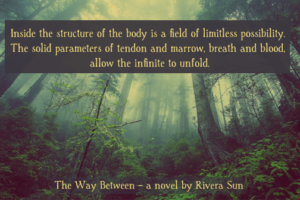 darkness were the forms of the Ones Who Slid Through Mist, the ancient Fanten ancestors, hundreds of them. Ari Ara saw them dancing the sacred dance, falling and tumbling in the motions of the wind-blown leaves. Like all of the Fanten daughters, she had been taught to follow the elder women and to learn the dance by mimicking their motions. And so, in Monk’s Hand Monastery, she fixed her eyes on the ancient spirits and followed their lead.
darkness were the forms of the Ones Who Slid Through Mist, the ancient Fanten ancestors, hundreds of them. Ari Ara saw them dancing the sacred dance, falling and tumbling in the motions of the wind-blown leaves. Like all of the Fanten daughters, she had been taught to follow the elder women and to learn the dance by mimicking their motions. And so, in Monk’s Hand Monastery, she fixed her eyes on the ancient spirits and followed their lead.
She did not know that she was moving in ways that even the living Fanten across the valley did not know, learning motions from the ancestors that had been lost over the years, dancing in patterns that the Fanten dancers in the forest would give their prize sheep to see. She could not see the stunned expressions of the orphans, trainees, and monks as she danced a ritual that predated the time of the Three Brothers and harkened back to when the Great Trees and Fanten Grandmothers were sisters, bound by breath and the primordial task of turning the world through the seasons. She could not see the living humans watch her eyes trace the dances of the ancestors as her body eerily whirled and trembled with the hint of death and transformation, the closing gate of autumn and the opening door of winter. She could not see the Head Monk’s mouth fall open as she shuddered in the motions of the shaking forests and rolled in the dry scrapes of leaves and branches. She could not see Shulen’s expression as a hint of tears rose in the Stone One’s eyes, and his lips trembled shut over memories no one knew about, memories of another time when he had watched the Fanten dance.
She saw nothing but the ancestor spirits and the eternal movement of the dance.
Read the rest of the story by getting a copy of The Way Between! Find ebooks here. And get a copy directly from the author here.
A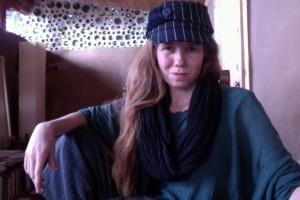 uthor/Activist Rivera Sun, syndicated by PeaceVoice, is the author of The Way Between, The Dandelion Insurrection, Billionaire Buddha and Steam Drills, Treadmills, and Shooting Stars, the cohost of Love (and Revolution) Radio, and the co-initiator of Live Share Grow: A Movement for the 100%. She is a trainer and social media coordinator for Campaign Nonviolence and Pace e Bene. Sun attended the James Lawson Institute on Strategic Nonviolent Resistance in 2014 and her essays on social justice movements appear in Counterpunch, Truthout and Popular Resistance. www.riverasun.com
uthor/Activist Rivera Sun, syndicated by PeaceVoice, is the author of The Way Between, The Dandelion Insurrection, Billionaire Buddha and Steam Drills, Treadmills, and Shooting Stars, the cohost of Love (and Revolution) Radio, and the co-initiator of Live Share Grow: A Movement for the 100%. She is a trainer and social media coordinator for Campaign Nonviolence and Pace e Bene. Sun attended the James Lawson Institute on Strategic Nonviolent Resistance in 2014 and her essays on social justice movements appear in Counterpunch, Truthout and Popular Resistance. www.riverasun.com
Dancing The Way Between Falling Snow – an excerpt from the novel
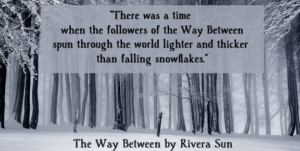 (Excerpt from The Way Between by Rivera Sun. Find it on Amazon.com or signed copies here.)
(Excerpt from The Way Between by Rivera Sun. Find it on Amazon.com or signed copies here.)
The days turned cold and the nights colder still. Frost drew its icy hand over the monastery, the forest, and the village. Ari Ara crept with trepidation around Shulen, haunted by what she had seen that night in the ravine. The Stone One stalked the monastery in a dark mood. Ari Ara rose at dawn for their training sessions cautiously and quietly. Shulen did not seem to notice. Perhaps he enjoyed a break from her regular impertinence. She responded to his suggestions attentively and found his explanations offered with patience. The urge to rail against his hard, stern ways subsided. Ari Ara didn’t have the heart for it; she had seen the Stone One cry.
The Old Monk Mountain’s bald head turned white with high altitude snows. One morning, Shulen slid back the door to her closet room and told her to get up quickly.
“Today you learn to dodge snowflakes.”
As the sky greyed over the mountains, he took her to the small field to the east of the monastery. Ari Ara’s breath hung on the air. The clouds thickened. A few flakes tumbled from the sky.
“Watch,” Shulen said gently.
He spread his arms and waited. A tiny snowflake wafted downward. Shulen turned delicately around it as it spiraled to the ground.
Ari Ara couldn’t help but smile. The Great Warrior . . . dodging snowflakes! A peal of delighted laughter rang out across the field as Shulen spun in a slow, languorous circle around the next flake. He grinned back at her and swiveled to move out of the path of another tiny white speck.
“Come, join me,” he invited. “My father taught me this, long ago.”
Ari Ara blinked. She could not imagine Shulen as a boy with a father who would teach him Azar among the swirling snow. The grey-haired Stone One wore a bittersweet expression as he reached out his hand to guide a flake to the frozen earth. He rolled over his left shoulder to avoid the next one.
Ari Ara joined him and soon discovered that it was far more difficult than Shulen made it appear. She could hardly see the tiny flakes – though they glared white against the black wool of her Fanten shepherdess cloak when they landed. The delicate lace of the snow was so lightweight that the back draft of her motions pulled the flakes toward her. They flipped and swooped in the slightest breath of air, catching her off guard. Ari Ara would have given it up for impossible if Shulen hadn’t been demonstrating it beside her.
They spun slowly in the almost silent hush of snow. Shulen spoke only once.
“You must be lighter than air and twice as sensitive. Move slow, even when they fall fast.”
It was strange and exhilarating. It was like the day among the leaves, but softer, subtler. She had to sense the presence of the nearly invisible flakes. At one moment, she felt the lift of the breeze and let it carry her along with the snow.
Then she saw it. The pattern snapped into alignment in her mind. Instead of moving away from the flakes, she tumbled with them, as part of them, maintaining her space within their dance, falling between them.
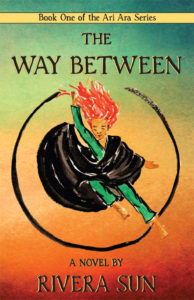 In the quiet, Shulen began to speak of the legends and myths of the old masters of Azar. There was a time when they spun through the world lighter and thicker than falling snowflakes. There were men and women, both, who could follow the Way Between with such grace and skill that they could fly on the wind and walk through walls. The followers of Azar danced on water and traveled through dreams. They could see into the future, turn invisible, and heal the dying with a single touch.
In the quiet, Shulen began to speak of the legends and myths of the old masters of Azar. There was a time when they spun through the world lighter and thicker than falling snowflakes. There were men and women, both, who could follow the Way Between with such grace and skill that they could fly on the wind and walk through walls. The followers of Azar danced on water and traveled through dreams. They could see into the future, turn invisible, and heal the dying with a single touch.
A true follower of Azar, Shulen murmured as he spun in the snow, could find the Way Between solid rock. In the driest peaks of the desert mountains, he or she could entice water to come singing out of stone.
He glanced at the child, whirling in the beauty of myths and snow, cheeks as red as her hair, blue-grey gaze seeing the masters of Azar in every swirl of wind. Her eyes shone with the stories of ancient times. Ari Ara’s grin curled across her face. A crack split in the Stone One, hair-thin, but irreparable. Without knowing it, she had found the Way Between the hard armor of Shulen’s heart.
The snow thickened. The wind kicked up. In seconds, both she and Shulen were covered with flakes. The temple bell rang out.
“Good work, kitten,” Shulen commented as they walked back down to the monastery. He let his hand fall on her head, giving her a pat of approval. “Even Emir Miresh never mastered the art of dancing the Way Between the Snow.”
Read the rest of the story by getting a copy of The Way Between! Find ebooks here. And get a copy directly from the author here.
A uthor/Activist Rivera Sun, syndicated by PeaceVoice, is the author of The Way Between, The Dandelion Insurrection, Billionaire Buddha and Steam Drills, Treadmills, and Shooting Stars, the cohost of Love (and Revolution) Radio, and the co-initiator of Live Share Grow: A Movement for the 100%. She is a trainer and social media coordinator for Campaign Nonviolence and Pace e Bene. Sun attended the James Lawson Institute on Strategic Nonviolent Resistance in 2014 and her essays on social justice movements appear in Counterpunch, Truthout and Popular Resistance. www.riverasun.com
uthor/Activist Rivera Sun, syndicated by PeaceVoice, is the author of The Way Between, The Dandelion Insurrection, Billionaire Buddha and Steam Drills, Treadmills, and Shooting Stars, the cohost of Love (and Revolution) Radio, and the co-initiator of Live Share Grow: A Movement for the 100%. She is a trainer and social media coordinator for Campaign Nonviolence and Pace e Bene. Sun attended the James Lawson Institute on Strategic Nonviolent Resistance in 2014 and her essays on social justice movements appear in Counterpunch, Truthout and Popular Resistance. www.riverasun.com
From the Desk of Rivera Sun
- Rivera Sun's profile
- 161 followers



